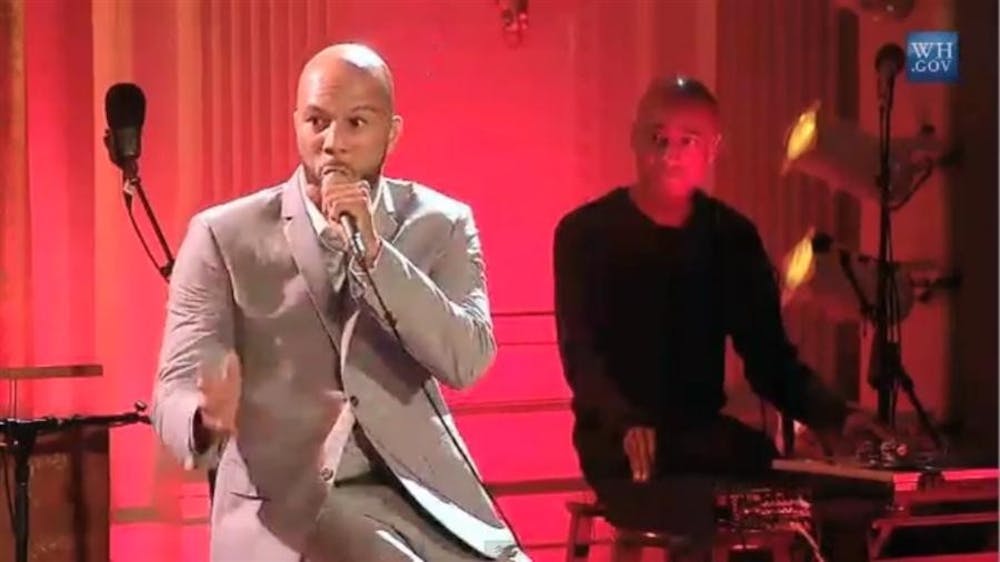It’s been an exciting month for Hip-Hop.
To start off May, the Beastie Boys released a new one, Cassidy became a suspect in a double murder case and Romeo got kicked off of “Dancing with the Stars”.
More notably though, Michelle Obama and the White House had many right-wing critics stirred up after the artist Common was invited to perform at a poetry event this past Wednesday. Also, LA shock-rapper Tyler, the Creator dropped a disconcertingly dark, sophomore album on XL records.
These two interesting events happened within one day of each other and raise questions about the fundamental nature of hip-hop music, its culture, and the various perceptions of it.
Sarah Palin and Fox News criticized the White House for inviting Common claiming the decision lacked class and decency. Palin accused the rapper of glorifying cop killing during an interview on Fox News’ “On the Record.”
The controversy
stems from lyrics in Common’s “A Song for Assata” and his poem “A Letter To the
Law.” The former is a tribute to Assata Shakur, a Black Panther member who was
controversially convicted of murdering a police officer. “A Letter to the Law”
describes Uzis, warriors, and shooting police
officers.
If we only follow the soundbites and look no deeper into this rapper’s message, his accusers seem justified in their claims.
Further reading of “Letter to the Law,” however, provides a refinement that dismisses fighting and calls for non-violent activism to bring change.
Further, “Song for Assata” merely raises contentions about the shooting and skewed trial, and is only radical in its refusal to recount the prosecution’s agenda.
Hip-hop is the medium for these messages because its nature is inherently positioned to incite controversy.
The music can trace
its roots to Black Arts and Harlem Renaissance
movements.
Firmly planted in traditions of activism and iconoclasm, the poetry of the Civil Rights era makes up a canon whose content is bold and unapologetic, often reactionary and explosive.
This kind of Hip-hop is constructive and works as a check of power, much like the press.
Analyzing controversial artists within the perspective of their backgrounds often turns negative first-impressions into valuable reality checks, as we’ve seen with examples like N.W.A.’s frank reaction to police brutality in “F*** tha Police.”
Sometimes it’s not so clear, though, how to interpret some rapper’s words. It doesn’t help that hip-hop is notorious for being polluted with misogynist, violent and materialistic lyrics, either.
So how are we to
evaluate something like Tyler, the Creator’s latest, “Goblin,” laden with what
looks like a lot of careless, irresponsible
obscenity?
Do we try and defend it with the same rationale we used for Eminem, ushering in a confessional type of rap that expresses insecurity and emotional vulnerability in a hegemonic, hardened genre?
Can we say that
Tyler is a product of a disenfranchised, fatherless urban society who’s pent up
emotion is finding a creative, albeit
scandalous, outlet?
Is the album viewable as a case study or are there any redemptive qualities to it, at all?
Creating a defense for Tyler isn’t nearly as satisfying as dismissing “Goblin” as meaningless, vulgar shock-rap for many.
Whatever a true evaluation is, it’s important that it doesn’t come immediately. All judgments of art should be a product of analysis and full consideration of the art’s context within its own unique background.
If there’s one thing hip-hop has shown us, it’s that much of what seems “bad” is more valuable when read as “reactionary” instead. There are always multiple perspectives to an issue to account for especially when more than one culture or socioeconomic background is involved.
So maybe Tyler, the Creator is nothing but a potty-mouth. But maybe he represents more.
As the outspoken Black Arts vanguard and former Poet Laureate of New Jersey, Amiri Baraka says, “all culture is necessarily profound. The very fact of its longevity, of its being what it is, culture, the epic memory of poetical tradition, means that it is profound. But the inherent profundity of culture does not necessarily mean its uses will be profound.”
Check out the "Hip-Hop Timeline" for some references to other controversial cases






